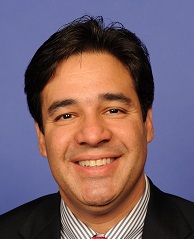By Bob Allen
The Southern Baptist Ethics & Religious Liberty Commission is backing a bill filed in Congress to protect religious institutions and other nonprofit groups that don’t recognize same-sex marriage from possible discrimination.
The Marriage and Religious Freedom Act, introduced Sept. 19 by Rep. Raúl Labrador (R-Idaho), “provides broad protections for citizens and organizations that support the definition of marriage as the union of one man and one woman,” Andrew Walker, director of policy studies for the public-policy branch of the Southern Baptist Convention, said in an issue-analysis brief on the ERLC website.
“The bill comes at a time when the advance of same-sex marriage is clashing with religious liberty and, sadly, it has been religious liberty that has taken a backseat,” Walker said.
With 62 co-sponsors, the bill would guarantee that no religious institution that falls within the 501(c) portion of the U.S. tax code can be denied or lose its tax-exempt status because it “celebrates and defines marriage as between one man and one woman,” according to a press release on Congressman Labrador’s website.
 “Regardless of your ideology, we can all agree about the importance of religious liberty in America,” Labrador said. “Our bill will protect freedom of conscience for those who believe marriage is the union of one man and one woman.”
“Regardless of your ideology, we can all agree about the importance of religious liberty in America,” Labrador said. “Our bill will protect freedom of conscience for those who believe marriage is the union of one man and one woman.”
“This is not a Republican or Democrat issue,” continued the tea party candidate elected in 2011. “As President Obama said, ‘Americans hold a wide range of views’ on marriage and ‘maintaining our nation’s commitment to religious freedom’ is ‘vital.’ We agree.”
Walker said the law is needed because of instances where a baker, a photographer and a florist all faced discrimination complaints for refusing their services in the context of a same-sex wedding ceremony.
“The success of same-sex marriage proponents in passing non-discrimination ordinances is part of a larger movement consisting of political and legal efforts that seek to change public and cultural opinion, often by acts of intimidation and coercion,” Walker said.
Opponents described the bill as an attempt to reincarnate the Defense of Marriage Act, a federal law found unconstitutional by the U.S. Supreme Court in June in a case involving a New York woman denied a federal estate-tax exemption for surviving spouses after the death of a same-sex partner that she legally married in Canada in 2007.
The American Civil Liberties Union said it would open a “Pandora’s Box” of discrimination against gay Americans.
“Religious liberty is a fundamental American value. It guarantees us the freedom to hold any belief we choose and the right to act on our religious beliefs, but it does not allow us to harm or discriminate against others,” said Ian Thompson, American Civil Liberties Union legislative representative.
“Gay and lesbian couples raise children, vote and pay taxes just the same as everyone else,” Thompson said, “but this legislation would allow these couples to be treated differently based on who they are.”
The Human Rights Campaign, the largest national lesbian, gay, bisexual and transgender political organization, called it dangerous legislation that would permit federal workers to refuse to serve married same-sex couples based on their personal religious beliefs.
“Every American understands the importance of protecting the rights of people of faith to hold and express their beliefs, including about the equality of lesbian, gay, bisexual and transgender people, but our Constitution and laws already strongly safeguard that liberty, said HRC legislative director Allison Herwitt.
Herwitt said the real purpose behind the legislation is “to let federal employees, contractors and grantees refuse to do their jobs or fulfill the terms of their taxpayer-funded contracts because they have a particular religious view about certain lawfully married couples — and then to sue the federal government for damages if they don’t get their way.”
The National Organization for Marriage, Focus on the Family, Concerned Women for America and the U.S. Conference of Catholic Bishops are also supporting Labrador’s bill.
“In a growing climate of intolerance against individuals and organizations who believe that marriage is the union of one man and one woman, this act is an important step in preserving their religious liberties at the federal level,” said Archbishop William Lori, chairman of the bishops’ Ad Hoc Committee for Religious Liberty.
“Among the many protections in this bill, the federal government would not be able to deny individuals and organizations a grant, contract or employment because their belief that marriage is the union of one man and one woman is informed by their religious faith,” Lori said.
